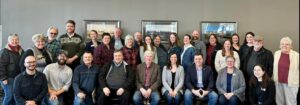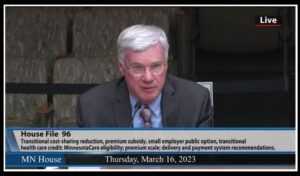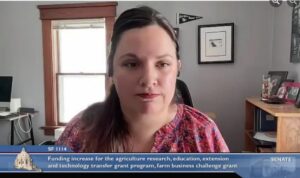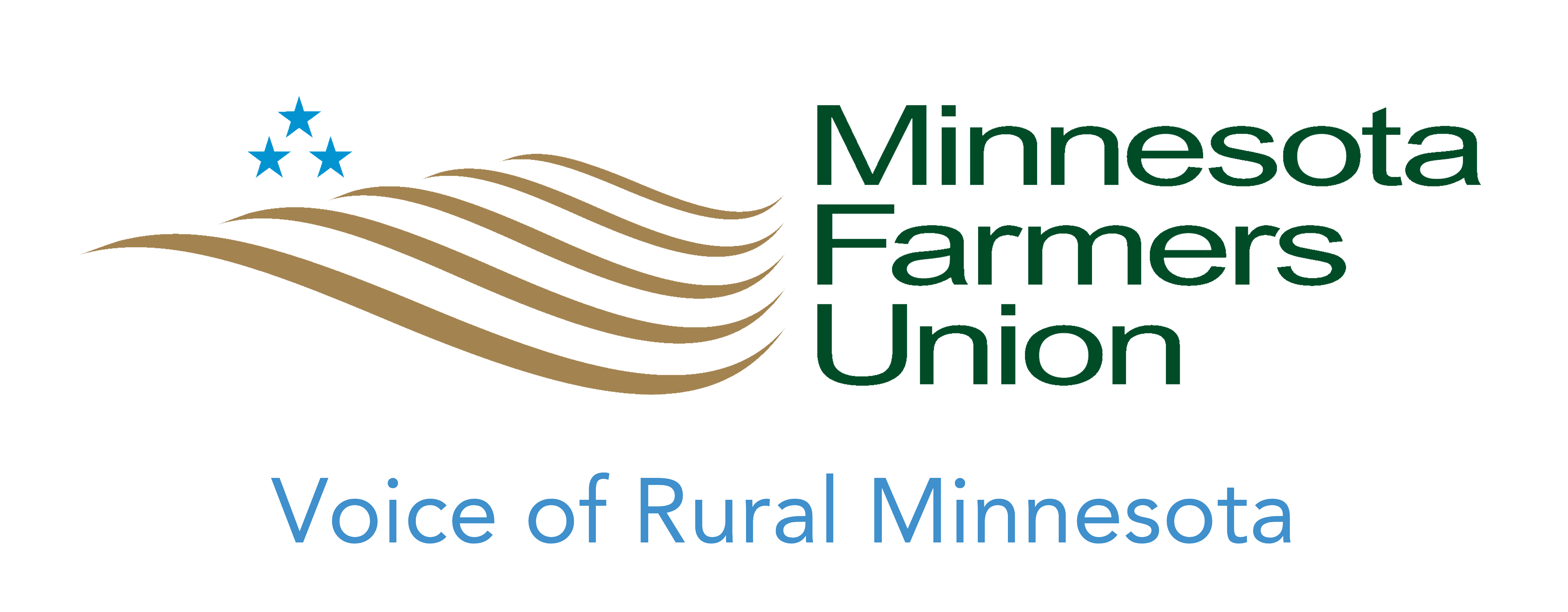Legislative Update: Dairy Assistance, Investment and Relief Initiative advances
It’s deadline week at the state capitol, which means legislators are putting in long days in order to hear new proposals ahead of Friday. As always, MFU is working hard to advance MFU’s grassroots policy priorities and ensure that policymakers are responsive to the needs and perspectives of family farmers.
An important part of this work is ensuring that key leaders are hearing directly from MFU members. You can find contact information for your representatives here.

MFU also put together a second agriculture listening session this past Saturday. Senate Ag Chair, Aric Putnam, DFL-St. Cloud, House Vice Chair, Kristi Pursell, DFL-Northfield, and Commissioner Thom Petersen gathered in Faribault to hear directly from farmers. The room at South Central College was filled with farmers—many from MFU, but others from partner organizations we work with at the state capitol. For an hour and a half, the lawmakers listened and took notes while the mic was passed between attendees, allowing the maximum time for farmers to make their voices heard. Those in attendance shared the importance of healthcare affordability, a grain indemnity fund, sensible regulations, Forever Green market development, farm to school, and a host of other issues.
“St. Paul feels like it’s far away sometimes,” Putnam said in the forum. “We must do a better job of making sure the people who are impacted by decisions we make aren’t just consulted, but are actually at the table. So, your being here is the first step in that direction.”
Along with many of the groups represented on Saturday, MFU is working hard to extend and expand the Beginning Farmer Tax Credit—an initiative led by ag Chairs Putnam and Samantha Vang, DFL-Brooklyn Park, (SF1879/ HF2277). This proposal would increase the credit for sale of ag assets to those in their first 10 years of farming from 5 percent to 8 percent, expand the credit to family members for sale of ag land to assist in generational farm transition, increase the credit for BIPOC farmers and eliminate the sunset on program. Importantly, the legislature needs to act to extend the credit this year or it is set to expire.
“This successful and pioneering program helps new farmers access land, equipment, livestock and other assets needed to build a life in agriculture,” said a joint letter MFU led along with 19 other agriculture organizations in support of expand the credit. “Taken together . . . [these changes] will strengthen this nation-leading program and better serve beginning farmers.”
Last week, the House bill received its final hearing in the Tax Committee and was met with supportive comments. This Tuesday, the Senate Ag Committee will hear the same.  Thank you to members Molly Byron (Waseca), Jane Windsperger (Kanabec), Kelsey Zaavedra (Chisago), and Dustin Weise (Crow Wing) for testifying on this proposal this session.
Thank you to members Molly Byron (Waseca), Jane Windsperger (Kanabec), Kelsey Zaavedra (Chisago), and Dustin Weise (Crow Wing) for testifying on this proposal this session.
MFU members also provided testimony in support of proposals to expand MDA’s popular Down Payment Assistance Program and the Next Generation Farmer Act, which would establish a new, state-sponsored internship program for people who want to learn to farm.
DAIRI program
Another proposal that is advancing quickly ahead of deadlines would restart the Dairy Assistance, Investment, and Relief Initiative (DAIRI) program.  First established in 2019, the program provided $8 million in to small- to medium-sized dairy operations who participate in federal risk protection. In order to qualify, farms needed to confirm with MDA that they enrolled in five years of protection through the USDA Farm Service Agency’s Dairy Margin Coverage (DMC) program. This updated proposal—led by Chairs Putnam and Vang (SF2763, HF2861)—is again aimed at ensuring all dairies are enrolled in federal risk protection.
First established in 2019, the program provided $8 million in to small- to medium-sized dairy operations who participate in federal risk protection. In order to qualify, farms needed to confirm with MDA that they enrolled in five years of protection through the USDA Farm Service Agency’s Dairy Margin Coverage (DMC) program. This updated proposal—led by Chairs Putnam and Vang (SF2763, HF2861)—is again aimed at ensuring all dairies are enrolled in federal risk protection.
Green fertilizer
MFU has also been working hard to shape an advance a state initiative that would scale the University of Minnesota Morris’s work to produce fertilizer using hydrogen produced by clean energy (SF2513, HF2762). As described by the author, Chair Putnam, the goals of the new incentive program are to lower emissions from the agriculture sector, keep more wealth in rural communities, stabilize the market for farm inputs, and help Minnesota farmers lead in producing and deploying hydrogen for other agricultural and industrial applications.
The current situation isn’t working well for farmers. Globally, the production of nitrogen fertilizer produced through burning natural gas and coal contributes 2 percent to emissions. Not only that, but it’s largely produced oversees, shipping wealth out of Minnesota and to four multinational companies that dominate 75 percent of the fertilizer market. As many MFU members know well, the price of nitrogen fertilizer nearly doubled in 2021.
The technology developed by the University of Minnesota would allow for the production fertilizer on an ethanol plant scale, using excess renewable energy off the grid. However, there are two big barriers to scaling the technology. First, it is hugely capital intensive to build the production facilities. And second, the long-term market—so long as it’s tied to conventional fertilizer—is unstable, making private financing difficult.
The proposal that MFU has brought forward would solve for both these issues and allow for farmer ownership by providing grants to agriculture cooperatives to purchase equity in production facilities. As a condition of the grant, they would then be required to entire into a long-term purchase agreement on behalf of their members. On Monday, a cooperative leader, Tom Traen, testified in support of the proposal alongside MFU Vice President Anne Schwagerl. He explained that cooperatives are excited about this proposal, because they recognize that the current market for fertilizer is unstable and potentially unreliable.
From a resiliency perspective, it’s valuable to have fertilizer production in our backyard. And for rural development, we believe strongly that farmers should benefit from scaling this technology, not the same multinational companies who dominate the market today.
Climate resilience
On the climate front, MFU has also worked to advance a new local government aid program for Soil and Water Conservation Districts (SWCDs) (SF526, HF735), an expansion of MDA’s soil health grant program (SF1245, HF1316), and funding for Extension to update local mapping and information about extreme weather (SF2547, HF1853).
Finally, on Monday, the bill that MFU proposed to bar confidentiality clauses in carbon market contracts was included in both the House and Senate omnibus policy bills, an important first step toward becoming law. This proposal was brought forward by Rep. Kristi Pursell, DFL-Northfield, and Sen. Mary Kunesh, DFL-New Brighton, (SF2557, HF1314) and is a result of MFU’s work on the Farmers Guide to Carbon Market Contracts. Resolutions in support of this proposal were also brought forward in Pine and Rice counties and is a great example of how MFU’s grassroots policy is translated into action.
Right to Repair
On Thursday, the Senate will hear an incomplete version of the Digital Fair Repair Act in the Judiciary Committee. In Senate Commerce, an amendment was adopted to strip ag equipment and other off-road vehicles out of the proposal. The House version is still intact and so an agreement will likely be negotiated in a conference committee later in session. If you support farmers right to repair, now is a good time to contact your senator.
MinnesotaCare, FBM
 MFU President Gary Wertish, provided testimony in support of the MinnesotaCare Buy-in (SF49, HF96) highlighting farmer stories and how the status quo isn’t working for families.
MFU President Gary Wertish, provided testimony in support of the MinnesotaCare Buy-in (SF49, HF96) highlighting farmer stories and how the status quo isn’t working for families.

MFU Vice President Schwagerl testified in support of expanding support for MN State’s Farm Business Management (SF1114, HF1147) based on her experience in the program.
As always, this is just a snapshot of MFU’s work at the capitol. This past week. MFU also testified on farmers market funding, meat processing grants, establishing a grain indemnity fund, funding for MN State to purchase ag technology, bills requiring pre-merger notification, wolf-livestock prevention grants and other issues. If you have questions, thoughts, or concerns about MFU’s legislative work, please reach out to Stu at (320) 232-3047 (C) or stu@mfu.org.
